| Srl | Item |
| 1 |
ID:
183780
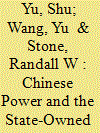

|
|
|
|
|
| Summary/Abstract |
China has become a leading source of outward foreign direct investment (FDI), and the Chinese state exercises a unique degree of influence over its firms. We explore the patterns of political influence over FDI using a comprehensive firm-level data set on Chinese outward FDI from 2000 to 2013. Using six country-level measures of affinity for China, we find that state-owned and globally diversified firms appear to conform most closely to official guidance. Official investment directives and state visits link investments to state policies; Taiwan recognition and Dalai Lama meetings anchor our political interpretations; and UN General Assembly voting and temporary UN Security Council membership suggest that this intervention may be systematic. The results are robust to country, year, and sector fixed effects, and most do not hold for private or small firms. The results suggest that China uses FDI by prominent state-owned enterprises as an instrument to promote its foreign policy.
|
|
|
|
|
|
|
|
|
|
|
|
|
|
|
|
| 2 |
ID:
082467
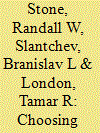

|
|
|
|
|
| Publication |
2008.
|
| Summary/Abstract |
International relations theory has borrowed important intuitions from Olson's static public-goods model (hegemonic stability) and the repeated prisoners' dilemma (theories of international cooperation), and arguments often combine implications from both models. We develop a general, repeated public-goods model. We then allow the qualitative dimensions of cooperation to emerge endogenously: agreements can have broad or narrow membership and entail deep or shallow commitments; they can be multilateral or discriminatory; they can be ad hoc or institutionalized. We find that the relationship between the distribution of power and international cooperation is complex: a large leading state forms a narrow coalition of intensive contributors, and builds institutions, while a smaller leading state forms a broader coalition that makes shallow contributions, and is more inclined to multilateralism
|
|
|
|
|
|
|
|
|
|
|
|
|
|
|
|
| 3 |
ID:
100452
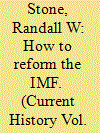

|
|
|
| 4 |
ID:
115311
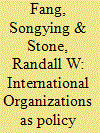

|
|
|
|
|
| Publication |
2012.
|
| Summary/Abstract |
How can international organizations persuade governments to adopt policy recommendations that are based on private information when their interests conflict? We develop a game-theoretic model of persuasion that applies regardless of regime type and does not rely on the existence of domestic constituency constraints. In the model, an international organization (IO) and a domestic expert have private information about a crisis, but their preferences diverge from those of the government, which must choose whether to delegate decision making to the expert. Persuasion can take place if the international institution is able to send a credible signal. We find that this can take place only if the preferences of the IO and the domestic expert diverge and the institution holds the more moderate policy position. This result contrasts with conventional wisdom, which holds that the necessary condition for IOs to exert influence is support from a domestic constituency with aligned preferences. Our model suggests that, far from being an obstacle to international cooperation, polarized domestic politics may be a necessary condition for IOs to exert effective influence.
|
|
|
|
|
|
|
|
|
|
|
|
|
|
|
|
| 5 |
ID:
111743
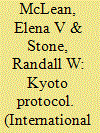

|
|
|
|
|
| Publication |
2012.
|
| Summary/Abstract |
The politics of ratifying the Kyoto Protocol may suggest a two-level game; yet, our quantitative analysis shows that ratification constraints did not affect bargaining over the Protocol, nor did bargaining outcomes affect ratification. The politics of the Kyoto Protocol are best understood as an example of the 'Europeanization' of international politics: European countries subordinate their domestic politics to international cooperation, and the European Union emerges as a key agenda setter. We find that European countries ratified the Protocol in lock step and offered selective incentives-such as EU accession-to most of the participants. Case studies of Russia and Poland confirm our interpretation of the empirical findings.
|
|
|
|
|
|
|
|
|
|
|
|
|
|
|
|
| 6 |
ID:
059288
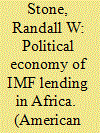

|
|
|
| 7 |
ID:
123622
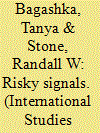

|
|
|
|
|
| Publication |
2013.
|
| Summary/Abstract |
It can be risky for governments to renege on exchange rate commitments, but it is misleading to characterize the costs as audience costs. While an audience costs approach assumes that the punishment for reneging is automatic, we model the choice of exchange rate policy in the shadow of elections as a signaling game between voters and governments, where governments have private information and voters are rational. We find that voters draw different inferences when they see reneging by different actors, and only Left governments are punished for breaking their promises. We test this hypothesis in the context of the post-Communist countries from 1990 to 2007 and find that Left governments were more likely to fall if they reneged on exchange rate commitments, but Right governments were not.
|
|
|
|
|
|
|
|
|
|
|
|
|
|
|
|
| 8 |
ID:
084824
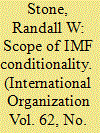

|
|
|
| 9 |
ID:
019519
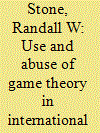

|
|
|
|
|
| Publication |
April 2001.
|
| Description |
216-244
|
|
|
|
|
|
|
|
|
|
|
|
|
|
|
|